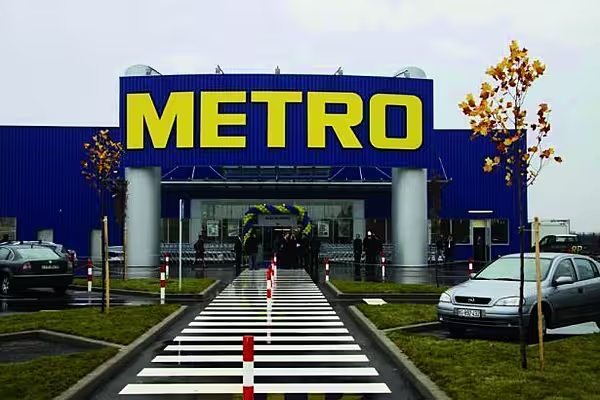Metro AG reported third-quarter sales and profit that missed analysts’ estimates, stung by currency swings and modernization costs as the German retailer prepares to split in two.
Sales fell 2.7 percent to 13.6 billion euros ($15.2 billion), Dusseldorf-based Metro said Tuesday. Earnings before interest, taxes and special items declined to 154 million euros from 209 million euros a year ago, with currency effects accounting for almost half the drop. The shares fell as much as 7.6 percent.
Chief Executive Officer Olaf Koch is preparing to split Metro into two companies, one that sells groceries and one for home appliances and technology. The move could speed each business’s operations and unlock currency for acquisitions. That’s important after last quarter’s results were hurt by less-profitable sales along with the costs of expanding e-commerce and opening a customer loyalty club for Media Markt electronics stores.
“Media Markt is the main reason for the weakness, the group citing unfavorable product mix among other factors,” Andrew Gwynn, an analyst at Exane BNP Paribas, said in a note.
Shares of Metro fell 7.4 percent to 26.39 euros at 11:01 a.m. in Frankfurt, trimming gains it had posted after the retailer announced its plans to split in late March.
‘On Course’
“We’re completely on course,” with the plan, Koch said in a conference call with reporters. Metro hasn’t identified any red flags in its work on the split and plans to give an update on capital structure and strategy on Sept. 8 and 9, he said.
The Media Markt and Saturn division’s margins narrowed on higher technology costs to support web sales and the cost of opening a customer club. Prices across the television market sank during the period, also hurting profitability, a spokesman said.
Less Food
Koch said the European soccer championship tournament in June and July hurt demand at its food wholesalers as restaurant customers ordered drinks but less food. Cash & Carry food stores’ Ebit more than halved to 101 million euros due to restructuring costs in Germany and Belgium. At Real markets, like-for-like sales at stores open at least a year declined by 3.5 percent.
Metro confirmed its full-year forecast for a slight increase in sales for the year ending in September and profit to be “slightly above” last year’s 1.51 billion euros.
Yet the results show the need for greater focus, despite Koch’s efforts to modernize by acquiring food and electronics-service companies and lopping off costs. Foreign-exchange losses, especially in the Russian ruble, dragged down profit, Metro said.
News by Bloomberg, edited by ESM. To subscribe to ESM: The European Supermarket Magazine, click here.














